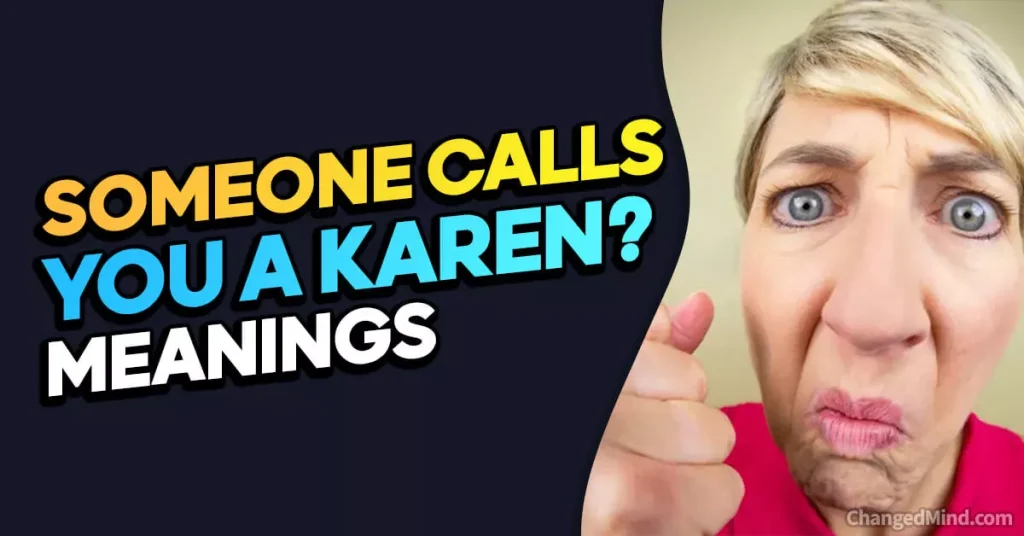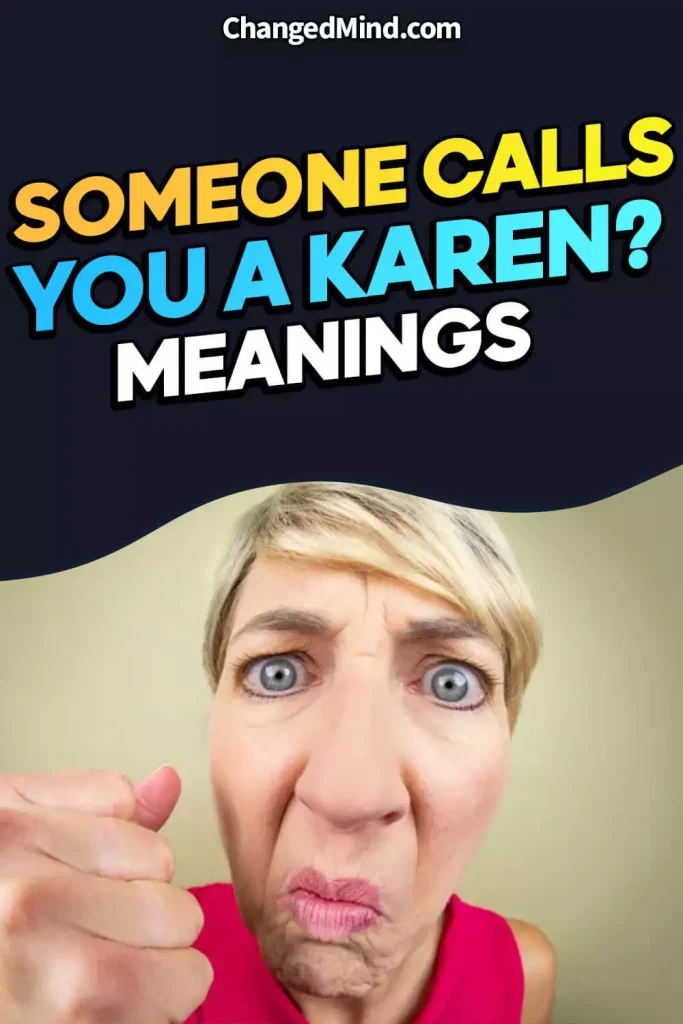Picture this: you’re sipping your favorite latte at a local coffee shop, and out of nowhere, someone drops the “K-word” on you! Wait, what?! It’s not your name or a secret code; it’s a label that’s taken the internet by storm.
If you’re scratching your head wondering, “What does it mean when someone calls you a Karen?” – fear not! We’re diving headfirst into the Karenverse to unravel this cultural phenomenon. From hilarious anecdotes to eye-opening insights, get ready for a rollercoaster ride as we uncover the truth behind the infamous title!
✨ The Short Answer: Being called a Karen is more than just a name; it’s a label that’s become synonymous with a particular behavior. In this article, we’ll explore the origins of the Karen meme, the characteristics of a “Karen,” and why the term has sparked both laughter and debates across the internet.
Whether you’ve been called a Karen or just want to stay in the loop of internet lingo, buckle up for a wild journey through the Karenverse!
📝 Key Points to Expect:
- The Karen meme: Origins and evolution.
- Unpacking the “Karen” characteristics.
- The impact of the Karen phenomenon on social media and pop culture.
- The controversy surrounding the use of the term.
- Tips for handling Karen moments with grace (or avoiding them altogether!).
The term “Karen” has gained significant attention and usage in recent years, often carrying a negative connotation. Understanding the meaning and implications of being called a “Karen” is essential in comprehending its impact on individuals and society as a whole.
By examining the meaning, origins, stereotypes, impact, and controversies surrounding the term “Karen,” we can foster a clearer understanding of this phenomenon, navigate misunderstandings, and promote a more inclusive and respectful society.

Key takeaway:
- Being called a “Karen” carries several negative stereotypes: It implies entitlement, complaining behavior, and racial undertones.
- Being labeled a “Karen” can have significant personal and professional consequences: It can result in public backlash, shaming, and damage to one’s reputation.
- The use of the term “Karen” is controversial: It raises questions about sexism and whether it effectively addresses issues or promotes understanding and empathy.
What is the Meaning of the Term “Karen”?
The term “Karen” is often used to define and explain the significance of a specific type of individual who displays entitled, demanding, and impolite behavior, primarily among women. When someone is labeled as a “Karen,” it typically implies a sense of entitlement, privilege, and a tendency to make unreasonable complaints and demands.
The term also carries racial connotations and is frequently used to describe white women who mistreat people of color. Being labeled as a “Karen” can have significant consequences, both socially and professionally. There are ongoing debates regarding whether this term is sexist or an effective way to address problematic behavior.
To fully comprehend the meaning of the term, it is crucial to consider the intentions and context surrounding its usage.
Ultimately, promoting empathy and fostering open communication are essential approaches to addressing problematic behavior, rather than resorting to name-calling.
Origins of the Term “Karen”

The term “Karen” has become a part of our pop culture lexicon, but do you ever wonder about its origins? In this section, we’ll dive into the historical context of the term and explore how it gained popularity and spread like wildfire.
Get ready to uncover the fascinating background behind this viral term and gain a deeper understanding of its impact on our society. Let’s unravel the mystery of the “Karen” phenomenon!
Historical Context of the Term
The historical context of the term “Karen” is rooted in African American communities dating back several decades. It gained prominence as a way to describe the entitled, demanding, and sometimes racist behavior exhibited by white women.
These individuals would frequently call the police on innocent Black people or make false claims to exert their authority, highlighting the power dynamics where white women felt entitled to control people of color.
With the rise of social media and the increased ability of marginalized communities to share their experiences, the term “Karen” has gained popularity and spread. It has become a tool for people to criticize behavior they perceive as entitled or demanding.
Being labeled a “Karen” can have serious social and professional ramifications, including damage to one’s reputation, loss of friends or followers, and negative impacts on career prospects. In today’s digital age, information and opinions spread rapidly, exacerbating these consequences.
Controversies have arisen surrounding the use of the term “Karen“. Some argue that it is a sexist term, singling out women for behavior that men also exhibit. Others question its effectiveness in addressing the underlying issues, as it can perpetuate stereotypes and impede productive dialogue.
To address misunderstandings and move forward, it is important to understand the intention and context behind labeling someone as a “Karen“. Not all individuals engaging in entitled behavior should be automatically labeled as such. Instead, specific actions and attitudes should be carefully considered before employing the term.
Encouraging empathy and fostering communication are crucial in navigating these issues. Instead of resorting to name-calling, open and respectful dialogue can enhance understanding and bridge divides. Approaching these conversations with a willingness to listen and learn from different perspectives is essential.
Popularity and Spread of the Term
The term “Karen” has gained incredible popularity in recent years. It has become a common way to describe a particular type of person, typically a middle-aged white woman, who exhibits entitled, demanding, and sometimes even racist behavior. This term originated within online communities and has since spread like wildfire throughout mainstream culture, thanks to the power of social media, memes, and viral videos.
There are several factors that contribute to the widespread popularity of the term. It resonates deeply with those who have had firsthand experiences with individuals who embody the characteristics of a “Karen”. These experiences are often shared online, thus amplifying the traction and recognition of the term.
The term “Karen” offers a way for people to address problematic behavior more directly. It ignites meaningful conversations about entitlement, privilege, and the underlying racial issues that permeate our society. By employing this term, individuals can more easily identify and discuss these important matters in a relatable and accessible manner.
The immense popularity and widespread dissemination of the term can largely be attributed to the influence of social media and meme culture. Memes featuring the term “Karen” have gone completely viral and have been enthusiastically shared by countless individuals, further augmenting its visibility.
In addition, influential figures and celebrities have played a significant role in popularizing the term by featuring it prominently in their own social media posts and interviews.
Stereotypes Associated with Being Called a “Karen”
Stereotypes associated with being called a “Karen” reveal a complex web of entitlement, complaining and demanding behavior, and even racial undertones. These stereotypes shed light on the dynamic interplay between individual actions and societal perceptions.
Exploring the sub-sections of entitlement and privilege, complaining and demanding behavior, and racial undertones will enable us to comprehend the multifaceted implications of being labeled a “Karen” in modern discourse.
Entitlement and Privilege
Entitlement and privilege are closely associated with the term “Karen.” Some characteristics and behaviors that are linked to entitlement and privilege include:
– Having a belief in one’s superiority or deservingness compared to others.
– Expecting special treatment or privileges based on one’s perceived status.
– Insisting on speaking to managers or supervisors in order to exert control.
– Demonstrating a lack of empathy or consideration for others.
– Using offensive or derogatory language to belittle service professionals.
– Acting as if one’s opinions or beliefs are automatically valid, regardless of evidence or others’ perspectives.
– Justifying inappropriate or disrespectful behavior based on social or economic status.
It’s important to note that not all individuals named “Karen” exhibit entitlement and privilege. Due to viral incidents and internet memes, the term has become associated with these particular behaviors.
To address entitlement and privilege, it is crucial to take the following actions:
– Foster empathy and understanding towards the experiences and perspectives of others.
– Actively listen and engage in meaningful dialogue, without dismissing the opinions of others.
– Acknowledge and challenge our own biases and assumptions.
– Be open to learning and personal growth for the sake of a more inclusive society.
– Practice humility and treat others with respect and dignity.
By actively addressing entitlement and privilege, we can work towards the creation of a harmonious and understanding society where everyone’s voices are heard and valued.
Move over divas, Karens are taking the stage with their complaining and demanding behavior.
Complaining and Demanding Behavior
Complaining and demanding behavior, often associated with the derogatory term “Karen,” is characterized by individuals who exhibit a sense of entitlement and make constant demands. These individuals frequently express dissatisfaction and insist on having things their way.
They have a tendency to exaggerate minor issues, creating unnecessary drama over trivial inconveniences.
It is not uncommon for them to consistently request to speak to managers or expect preferential treatment. They can be impatient, expecting immediate resolution to their complaints. The presence of complaining and demanding behavior puts others in tense and uncomfortable situations as they feel pressured to fulfill these demands.
Those who exhibit this behavior can be confrontational and hard to please. Accepting that their demands may be unreasonable or unrealistic is often challenging for them.
This behavior can strain relationships and lead to negative interactions. It is important to note that not all individuals who engage in complaining and demanding behavior can be categorized as “Karen,” as this stereotype may oversimplify their actions and motivations.
To effectively address this behavior, it is crucial to communicate openly and respectfully, attempting to understand the underlying concerns or frustrations that drive it.
Encouraging empathy and considering different perspectives can foster productive dialogue and enable the discovery of mutually satisfactory solutions.
Racial Undertones
The use of the term “Karen” incorporates and highlights racial undertones that contribute to its negative connotation and impact. This term specifically refers to entitled and privileged behavior displayed by white women, particularly in their interactions with people of color.
By using the term “Karen,” instances of discriminatory actions or racially biased behavior by white women can be emphasized. This can include frivolous complaints targeted at people of color, the use of racist language, or attempts to exert power and control over them.
The term perpetuates stereotypes of entitled and demanding white women who hold a belief in their superiority over people of color. These stereotypes not only reinforce power imbalances, but also contribute to the marginalization and oppression of minority communities.
It is important to acknowledge the impact labeling someone as a “Karen” can have on people of color. This can result in significant emotional and psychological effects, worsening feelings of powerlessness, discrimination, and frustration when they encounter instances of racism and systemic oppression.
It is crucial to consider the intersectionality of identity and experiences when using the term “Karen.” Women of color may face derogatory labels that compound both racial and gender biases, leading to increased marginalization.
Addressing the racial undertones associated with the term “Karen” is essential in promoting inclusivity and equity. This requires continuous education, self-reflection, and open dialogue to fully comprehend the harmful effects of racial bias and work towards dismantling systemic inequalities.
Being labeled a ‘Karen‘ can have serious consequences, from public backlash and shaming to social and professional repercussions.
The Impact of Being Labeled a “Karen”
Being labeled a “Karen” can have serious consequences in today’s society. In this section, we’ll explore the impact this label has on individuals and the ripple effects it creates.
From public backlash and shaming to its social and professional consequences, we’ll uncover the harsh reality of being called a “Karen” and the lasting effects it can have on one’s reputation and relationships. Buckle up as we dive into the complexities and ramifications of this widely-used term.
Public Backlash and Shaming
The phenomenon of public backlash and shaming associated with being called a “Karen” highlights the power of social media today. It reminds us to be empathetic and understanding in online interactions and to consider the potential consequences of behavior perceived as entitled, demanding, or problematic.
Social and Professional Consequences
The term “Karen” has gained attention recently, and being labeled as such can have both social and professional consequences. Here are some of the repercussions that individuals may face when they are referred to as a “Karen“:
1. Reputation damage: When someone is labeled a “Karen,” it implies a sense of entitlement and excessive complaining or demanding behavior. This negative perception can harm one’s reputation within their social circles and communities.
2. Social exclusion: The stereotype of a “Karen” often leads to exclusion from social events because of the expectation of complaining or demanding behavior. This can result in feelings of isolation and loneliness.
3. Online backlash: The “Karen” stereotype has been perpetuated on social media platforms. When someone is labeled a “Karen” online, they may encounter intense public backlash, cyberbullying, and personal attacks. Consequently, this can lead to the loss of online friendships or connections.
4. Impact on professional life: The term “Karen” can have consequences in the workplace. Employers may perceive individuals associated with this stereotype as difficult to work with, lacking professionalism, or prone to conflict. Such negative perception can hinder opportunities for promotions and damage professional relationships.
5. Damage to personal relationships: The negative connotations attached to being labeled a “Karen” can strain personal relationships. Family members, romantic partners, and even children may feel embarrassed or frustrated by someone’s behavior and the associated label. As a result, conflicts within the family unit can arise.
The consequences of being labeled a “Karen” can vary depending on the context and individual circumstances. It is crucial to be mindful of our actions to avoid falling into these stereotypes and the potential social and professional pitfalls they bring.
Unleashing the Controversy Beast: Debating the Sexism and Effectiveness of the ‘Karen’ Phenomenon.
Controversies surrounding the Use of “Karen”
The use of the term “Karen” has ignited recent controversies and debates. Originally, it was used to describe entitled white women, but it now encompasses a broader range of individuals exhibiting similar behavior, regardless of their race. These controversies give rise to concerns about perpetuating stereotypes and undermining discussions about privilege and power dynamics.
One of the controversies surrounding the term “Karen” revolves around its potential for misuse and misapplication. Some argue that it has been excessively utilized and transformed into a generic insult, thereby losing its initial purpose of highlighting problematic behavior.
This misuse of the term can unfairly shame individuals who do not possess the characteristics associated with a “Karen“. It is crucial to exercise caution when using this term and refrain from deploying it to dismiss legitimate concerns.
Another controversy stems from the gendered nature of the term. Critics maintain that it unfairly targets women and perpetuates harmful stereotypes. Entitlement and demanding behavior are not exclusive to any particular gender. By solely associating these behaviors with women, the term “Karen” reinforces gender biases and hinders advancements towards equality.
The use of “Karen” triggers discussions about privilege and power. Some argue that the term diverts attention from larger conversations about systemic injustices and inequalities. While addressing individual entitlement is important, it is vital not to lose sight of the broader picture. What Does It Mean When Someone Calls You a Karen?
Fact: According to a survey conducted by the Pew Research Center, 66% of adults in the United States believe that addressing broader societal issues such as racism and inequality is more significant than focusing on individual instances of entitlement or demanding behavior.
Is “Karen” a Sexist Term?
The term “Karen” gained popularity recently, used to describe entitled and demanding behavior exhibited by individuals, particularly white women. It is essential to analyze whether this term is sexist.
1. “Karen” is not inherently sexist: The term “Karen” does not specifically target women based on their gender but highlights a particular behavior pattern. It is not limited to women only, as men can also exhibit similar behavior and be referred to as “Karens“.
2. Focus on behavior, not gender: The term “Karen” primarily focuses on entitled and demanding behavior, regardless of gender. It is not a generalization of all women but refers to individuals who display such behavior.
3. Reflecting societal issues: The term “Karen” may reflect deeper societal issues related to entitlement and privilege instead of being solely about gender. It is crucial to address these underlying issues constructively.
4. Not all criticism is sexist: Criticizing someone’s behavior or actions does not automatically equate to sexism. The term “Karen” is a way to hold individuals accountable for their actions and their impact on others.
5. Context matters: Like any term or label, the context in which the term “Karen” is used is important. It is essential to avoid using it to attack or demean individuals without valid reasons or when it perpetuates harmful stereotypes.
Is calling someone a Karen an effective way to address issues or just another entitled complaint?
Is “Karen” an Effective Way to Address Issues?
The use of the term “Karen” when addressing issues has become a contentious topic. Some argue that calling someone a “Karen” effectively addresses problematic behavior, while others disagree. Let’s examine whether labeling someone as a “Karen” is an effective approach.
First, it is important to note that the term “Karen” has gained popularity to identify individuals who display entitled and demanding behavior. By labeling someone as a “Karen,” it highlights problematic tendencies like complaining and making unreasonable demands.
Proponents argue that using the term draws attention to these behaviors and holds individuals accountable. Calling someone out as a “Karen” may discourage them from continuing their behavior and encourage self-reflection. It also signals to others witnessing the situation to be aware and address similar issues proactively.
It is crucial to consider the potential negative consequences of using the term. Misuse or overuse of the label can lead to harmful generalizations and stereotypes. If the person being labeled becomes defensive or dismissive, it may hinder productive dialogue or resolution.
To determine the effectiveness of labeling someone as a “Karen,” we must evaluate the specific context and intent. Engaging in respectful and empathetic communication is crucial when addressing issues. While the term may help recognize problematic behavior, it should be accompanied by open dialogue and an effort to understand each other’s perspectives.
Pro-tip: Instead of using labels, focus on addressing specific behaviors causing concern and engage in respectful conversation to find a resolution. Understanding and constructive dialogue are key to effectively addressing issues and fostering a more inclusive and harmonious society.
Let’s bridge the gap between Karens and empathy, one conversation at a time.
Addressing Misunderstandings and Moving Forward
In order to address misunderstandings and pave the way for progress, it is crucial to dive into understanding intent and context, while also fostering empathy and effective communication.
By exploring these two vital aspects, we can gain valuable insights into the complexities surrounding being called a “Karen” and work towards creating a more inclusive and harmonious society. Let’s delve into the intricacies of intent, context, empathy, and communication to pave a path towards understanding and reconciliation.
Understanding Intent and Context
Understanding Intent and Context is crucial for interpreting the meaning behind being called a “Karen.” Consider the specific situation, tone of the conversation, and the intentions of the person using the term.
1. Context: The context plays a significant role in understanding the meaning of the term. Consider the entire conversation or incident when interpreting its intent.
2. Intent: Analyze the intent behind calling someone a “Karen.” Determine if it highlights problematic behavior, addresses entitlement issues, or dismisses valid concerns. The intention can range from criticism to mockery.
3. Perception: Different people may perceive the term differently. Some view it as a valid critique, while others find it offensive. Consider how individuals interpret and react to the term to understand its implications.
4. Open Communication: Key to understanding the intent and context behind being called a “Karen” is open communication. Engage in dialogue and seek clarification to prevent misunderstandings and promote empathy. Approach conversations with an open mind and be willing to listen and learn from different perspectives.
By considering intent and context, we can better understand the implications and address any misunderstandings.
This leads to more effective communication and productive conversations about behavior and social issues. To learn more about the term “Karen” and its meaning, check out What Does It Mean When Someone Calls You a Karen?
Fact: The term “Karen” gained popularity with the rise of social media. It has sparked discussions about privilege, entitlement, and the impact of certain behaviors on marginalized communities.
Encouraging Empathy and Communication
Encouraging empathy and communication is essential when dealing with misunderstandings and moving past the “Karen” label. It is crucial to foster understanding and provide a space for open dialogue to resolve conflicts and bridge gaps between individuals.
Actively listening to others and seeking to understand their perspectives can help cultivate empathy and promote effective communication.
Here are some ways to incorporate these keywords into the text:
- Listen attentively: Take the time to listen to others without interrupting or dismissing their concerns. Understand that everyone has their own experiences and feelings; validate their emotions. This encourages empathy and communication.
- Show empathy: Put yourself in the shoes of others and try to understand their point of view. Recognize that their feelings and experiences are valid, even if they differ from your own. Empathy helps create connections and understanding, promoting empathy and communication.
- Use respectful language: Engage in discussions using respectful and non-confrontational language. Avoid making derogatory remarks or personal attacks. Express your thoughts and feelings calmly and respectfully. This promotes empathy and communication.
- Seek common ground: Look for areas of agreement and shared values. Finding common ground fosters understanding and productive conversations. Building on shared beliefs leads to finding solutions and moving forward, encouraging empathy and communication.
- Practice active communication: Proactively seek clarity and understanding from others. Ask questions to gain a deeper understanding of their perspective and ensure effective communication. Active communication prevents misunderstandings, promoting empathy and communication.
- Avoid making assumptions: Don’t make assumptions about others based on preconceived notions or stereotypes. Approach conversations with an open mind and a willingness to learn and understand different viewpoints. This encourages empathy and communication.
By encouraging empathy and communication, we can create an environment where individuals feel heard, respected, and valued. This lays the foundation for resolving conflicts, building meaningful connections, and moving forward positively and constructively.
Some Facts About “What Does It Mean When Someone Calls You a Karen?”:
- ✅ The term “Karen” originated from Black Twitter in the 2010s or from a character named Karen in the film “Mean Girls” or “Goodfellas”. (Source: Our Team)
- ✅ “Karen” is a pejorative slang term used to describe an obnoxious, angry, entitled, and often racist middle-aged white woman. (Source: Our Team)
- ✅ Karens are often associated with a bob haircut and a tendency towards entitlement. (Source: Our Team)
- ✅ The meme gained prominence in 2018 when it became attached to viral videos showing white women racially targeting people of color. (Source: The Guardian)
- ✅ The meme has sparked discussions about privilege, racism, and sexism in online discourse. (Source: The Guardian)
Frequently Asked Questions
What does it mean when someone calls you a Karen?
When someone calls you a Karen, they are using a slang term to describe an annoyingly entitled, middle-aged white woman who often demands to speak to managers or complains about minor issues.
Where did the term “Karen” come from?
The term “Karen” is believed to have originated from Black Twitter in the 2010s or from a character named Karen in the films “Mean Girls” or “Goodfellas.” It gained popularity in 2020 as a way to call out white women engaged in racist acts.
Is being called a Karen offensive or ageist?
While some people may find it offensive or ageist, most people named Karen have a good sense of humor about it. The term is used to criticize specific behavior and is not meant to target all individuals named Karen.
What are some common Karen behaviors?
Common Karen behaviors include blowing minor issues out of proportion, demanding to speak to the manager, and exhibiting entitlement. This can include being upset over small matters like giving raisins to kids on Halloween or making demands based on personal preferences.
How has the “Karen” meme evolved during the COVID-19 pandemic?
During the COVID-19 pandemic, the term “Karen” has been used to describe women who refuse to follow social distancing guidelines or stay-at-home orders. It has also been used to describe those who excessively call out others for not following regulations.
Is the “Karen” meme considered misogynistic?
The “Karen” meme has been criticized as misogynistic, but it is more typically used by black women and working-class women to criticize wealthy and often white women for enacting classism and racism. Some Karens have even used the meme as a learning opportunity to be more mindful of others.







